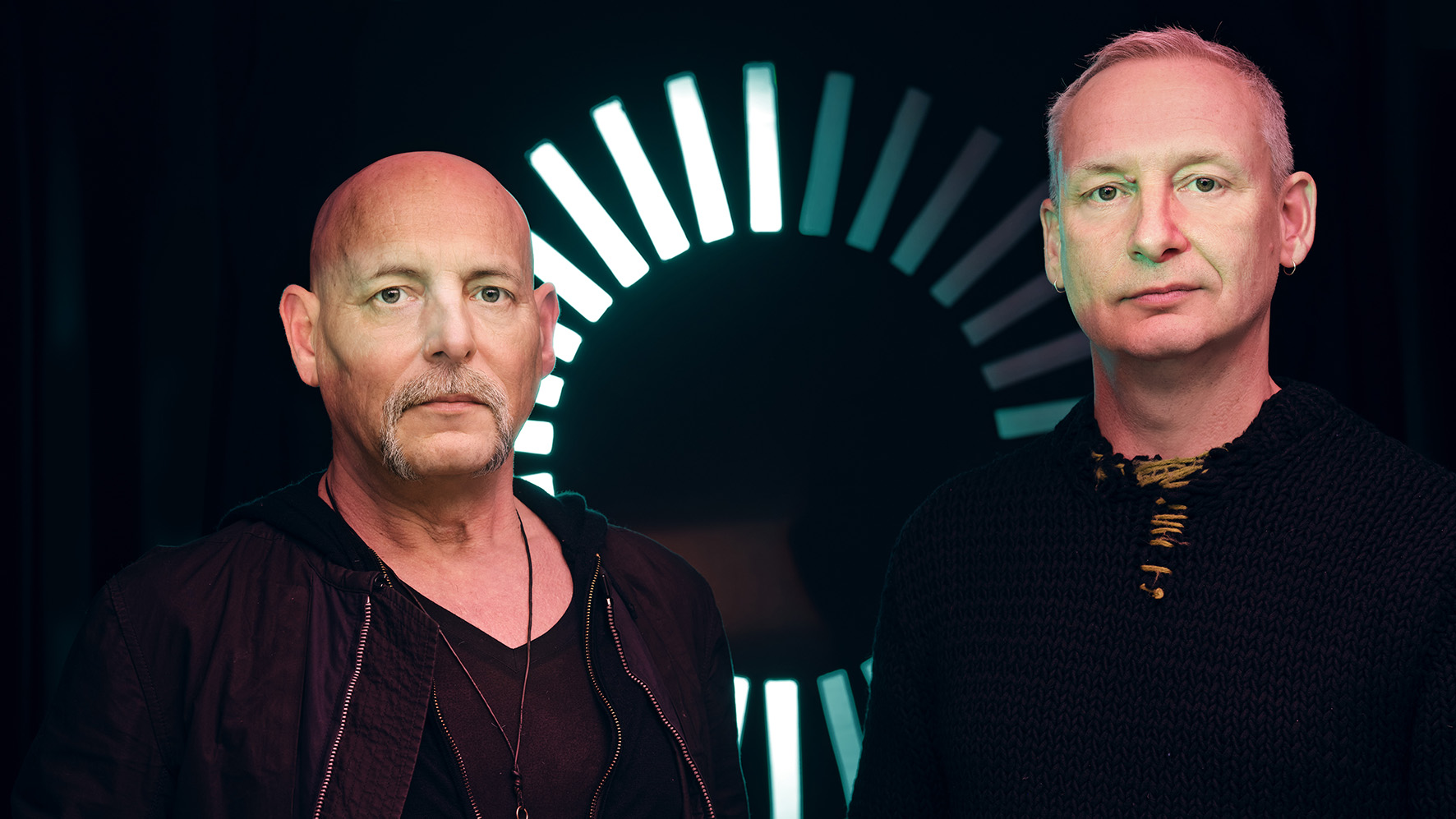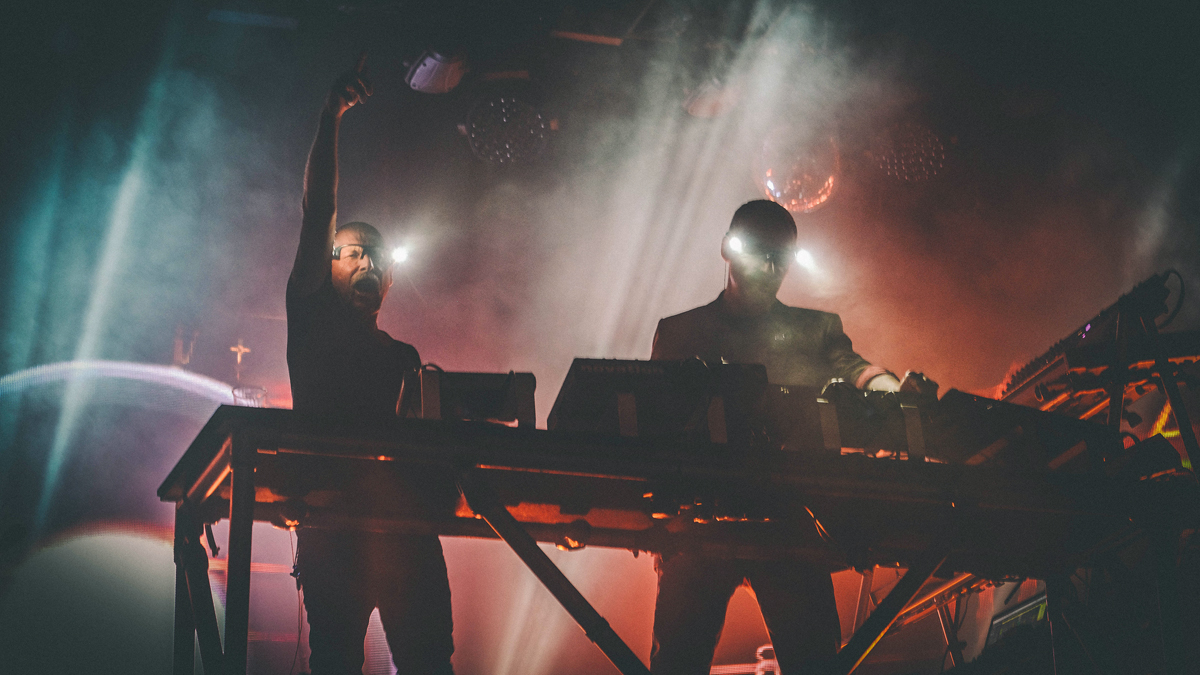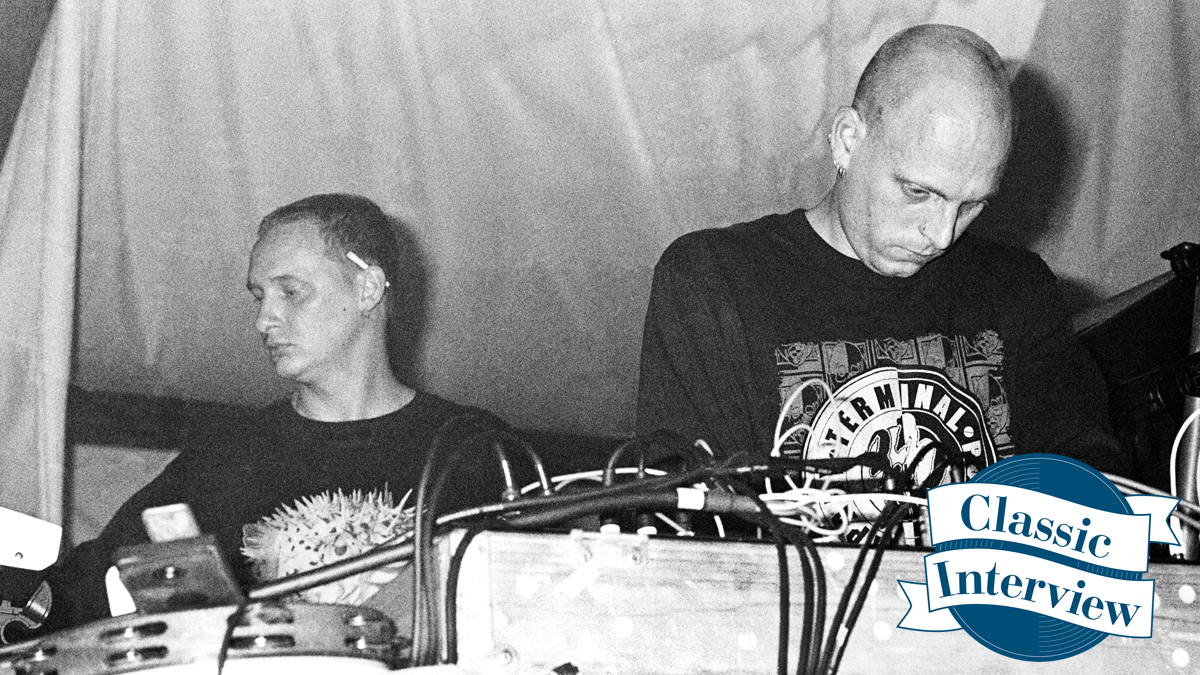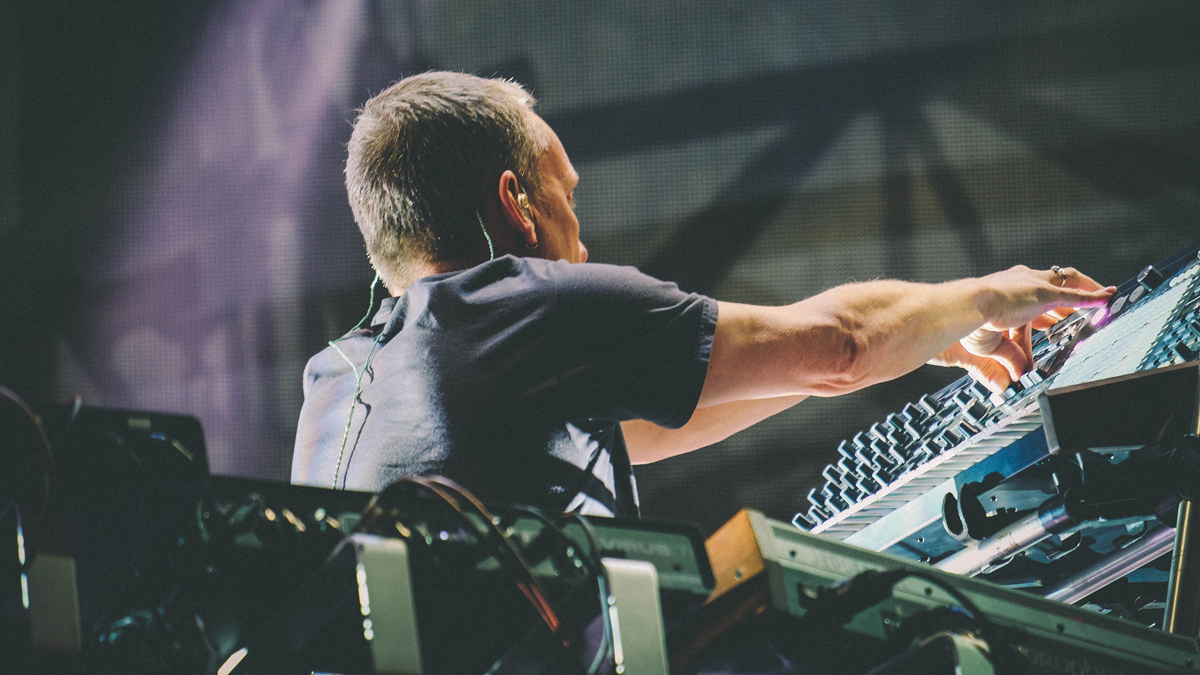Orbital: "Ableton Live does all the things I wanted a sampler to do when I first bought one"
The Hartnoll brothers reflect on 30 years in electronic music ahead of the release of their career-spanning anniversary album

Want all the hottest music and gear news, reviews, deals, features and more, direct to your inbox? Sign up here.
You are now subscribed
Your newsletter sign-up was successful
Coming out of the fields, warehouses and illegal parties of the late ‘80s rave summer of love, Orbital have reshaped the possibilities of what an electronic band can do.
Ever since Chime, a track knocked up on a 4-track in a cupboard under the stairs at brothers Paul and Phil Hartnoll’s parents’ house, became an immediate rave anthem, their mark on electronic music has been as distinct and idiosyncratic as the torch-adorned glasses that the pair wore in live shows throughout the ‘90s. Redefining what a couple of humans and a stage full of electronics can do in front of a huge festival crowd, Orbital led the way for fellow crossover artists like The Chemical Brothers, Leftfield and The Prodigy to follow.
Now, after a hiatus, the brothers are back. Kind of. There’s 30 Something, a best-of package made up of reworks, remakes and reimaginings, capturing in the studio the live evolution of stone-cold classics like Belfast, Halcyon and Satan, together with remixes by an eclectic array of cap-doffing producers ranging from Jon Hopkins and ANNA to Logic1000 and Shanti Celeste. Then, there’s the score for Mike Myers’ Netflix spy comedy The Pentaverate, centered around the rehabilitation of their John Barry-influenced Top 20 single The Box.
We caught up with Paul and Phil to find out more about these new projects, the evolving nature of their music and how they use technology as a creative tool.
With 30 Something, was it an important thing for you guys to capture how the tracks have evolved rather than putting out a standard greatest hits package with the original versions?
Paul: “Yeah, I think so. Because of the nature of how we play live and improvise the tracks, they've developed over the years, and they just keep changing and developing. I've always liked the idea of comparing an early recording to a modern recording. We took the tracks that are always in the live set that never seem to disappear and recorded them how we play them live now, but doing that in the studio means you can then play with them a little bit more than you would live. So they went another level as well, just a little bit, but mostly they're pretty much true to live versions of how they are live now.”
Some of the earliest recordings go back more than thirty years. Was it interesting when you were putting the album together to take a step back and see how they’ve grown up?
Want all the hottest music and gear news, reviews, deals, features and more, direct to your inbox? Sign up here.
Phil: “Yes. How they've developed or how they've Chinese-whispered themselves into something else. We did a gig and we were playing Halcyon and somebody said they didn't even recognise it as Halcyon. I remember saying to Paul, I think we should go and listen to the original recordings compared to what we've got now, and we realised how they’ve twisted and changed and chopped about from how they started.”
In terms of your music evolving over the years, what has been your attitude towards incorporating new equipment?
Paul: “Well, that develops and changes all the time as well. The live setup is an ever evolving thing and that also dictates how you do it because you do something on a different synth or you try it out on something else, it develops the track again in yet a different way. If you play live music it’s an ever evolving thing and there is no definitive version, it’s just whatever it is on the night. And because we improvise, the structure can be completely different from Saturday night in Stockholm to Sunday night in Dublin, because you respond to the audience, they bring you what they want, and you try and give it to them. You try and work as a team. If they're not liking it, you feel it.”
The Novation Bass Station 2 can cover pretty much most of the ground most of our old Roland monosynths used to do
Phil: “But regarding the equipment, we've whittled it down because we used to have two racks of big analogue synths and equipment and Paul had his Macbeth, which is okay, but when you try to travel with all that as well, which we actually did do for a while, it had to be shipped by lorry first. And also we used to carry our own mixing desk around with us. We’ve whittled it down to cases that we can actually fly with and the mixing desk has been replaced with a bunch of controllers that are linked in with Ableton. Ableton has helped us do that a lot more rather than previously with the MMT8s.
“Essentially, this has enabled us to be a lot more freer and flexible and cheaper to fly all the equipment with all the crew. We've got a good backline guy that has to pack everything in triplicate, because you need a back-up of certain synths. By whittling it down, it's been the most dramatic development with the equipment.”
You mentioned Paul’s Macbeth. We all know about the vulnerabilities of using analogue synths with traveling - were there any times you recall where something went really massively wrong on the road?
Paul: “That can happen. Sound-wise, everything's always backed up to the hilt, so if we lost something like a Jupiter-6 synthesizer, we can pump the sounds back in. I could dial them up as well, it’s just a bit more of a pain in the ass. But we found certain synths didn't travel well and we had to eliminate them from our setup, like the Oberheim Xpander and the Oscar. The Jupiter-6 has been with us for years, that started to go a bit wrong, so we've swapped it out for something else. And then it's fun to then explore the new synth and find out what that does. And then that makes you play the track in a different way, which is all good fun, really.
“Then there's a lot of really nice, modern analogue synths that have come out but they're a lot smaller. So you can have the whole of a Prophet-5 in a little rack, but it's still got all the knobs and it's still got all the big sound and a lot more modern options as well, like the Novation Bass Station 2 can cover pretty much most of the ground most of our old Roland monosynths used to do, and it's really robust live too.”
Phil: “Obviously with analogue, you've got the tuning problems as well.”
We opened up the back of the synths and were tipping water out the back of the Macbeth, we were getting out hair dryers and everything
Paul: “Lots of things used to go out all of the time. You just have to be brave and grab hold of the tuning knob and when you feel good, you know it's in tune. It's often just down to that, just a bit of bravery, you kind of go: ‘well, I know it's out of tune, I'm feeling awkward, give it a little tweak, when I stop feeling awkward, it's okay.’”
Phil: “There was a festival we were doing in Poland once back when we had the Macbeth and all of a sudden, this freak storm came across and all the health and safety wouldn't let us go on the stage. Laptops were literally flying off of the rack and the water was coming in horizontally and we couldn’t play. Quite literally we opened up the back of the synths and were tipping water out the back of the Macbeth, we were getting out hair dryers and everything. Then, the AC on the bus stopped working so nothing was drying. But we did the gig the next day didn't we?”
Paul: “Yeah, we got it together in the end.”

As well as the old kit, you've really embraced Ableton and DAW technology. What is your relationship with merging the old and the new?
Paul: “It's fantastic, that's why I love Ableton because it's so flexible with time, it does the things that I always thought a sampler did and then was very disappointed to find out they didn't do when I first got one. We remember the advent of computers, it was all sequencers when I first started, it wasn't even computers, and then computers made it easy. Now I do everything on a laptop and I've got as many audio channels as I want. The freedom of not using tape is extraordinary. I love it.

“I'd never go back, but yet around me are loads of analogue synths that I also love for their sound. But the thing I love about it is you, you do an analogue synth line while you're feeling in the zone and then that kind of helps you dictate how the track's gonna go, then you can chop it all up and use that as your inspiration and then do it again If you want to, it's never ending, but that’s the key to know your composition and know when to end.
“But then that goes back to what we were saying. What is the end? Is it the recording for that particular record? It's not the end of that track's life, it's then gonna go on the road and develop and become something else.”
Although Orbital began during the same time as the original rave era, we get the impression that even initially you never saw yourselves limited to being a rave act? We’ve read that your early influences included Tamla Motown, Trojan Records, punk bands like Crass and electronic artists like Cabaret Voltaire.
Phil: “Even with Chime, which was a so-called dance anthem, and even though it springboarded us to get a deal with London Records through Pete Tong, we were always not gonna write an album of Chimes. We've got Satan in there for god's sake, we've got influences from the dancefloor, but we're an electronic band.
Chime was one of those free-form tracks that happens because you're not thinking about it
“From the beginning we wanted to do albums and trying to get Pete Tong's head around that was tricky initially. It’s not like it’s a new thing: Kraftwerk, Depeche Mode, they’re not dancefloor-specific, and then he went with it in the end and we never looked back. It's electronic music. We've always been an electronic band, this opened up the freedom from having to write for the dancefloor, that’s too restricting.”
How did Chime come about? We heard it was recorded in a cupboard under the stairs.
Paul: “Our parents turned the cupboard under the stairs into a little office. Well, that was the studio. I knocked Chime up real quick one day, because I just had an idea of if I could use the 4-track as a 6-track by bypassing the recording process and going straight to mastering it. I thought, I've gotta knock something up, so Chime was one of those free-form tracks that happens because you're not thinking about it. I wasn't thinking about the music, I was thinking about the process and the track happened almost by accident, and so often when you do that, a totally subconscious thing happens. I don't know if I could have ever made that track if I’d been thinking about it.”
The Box was one of the key electronic tunes of the 90s, a massive hit and it had a very soundtrack-esque quality. Does it feel apt that now it’s become the theme to the Mike Myers Netflix show The Pentaverate?
Paul: “I think it goes back to John Barry with The Box. John Barry and all those late night reruns that you used to watch of the Avengers and the Prisoner, all those psychedelic spy thrillers were a massive influence on growing up.”
Phil: “Funnily enough, The Pentaverate is what The Box would have been waiting for all these years. We couldn't believe it, we couldn't have asked for better for that.”
Paul: “One of the English writers played the box to Mike Myers when they were playing through stuff to find the theme tune and he heard it and started thumping his fist going ‘that's it, that's the track! That's what we need for the theme tune!’”

In The Box, like Chime, or Belfast, or any Orbital track really, there's a certain indefinable texture that is as unmistakeable as Beach Boys' harmonies or Nile Rodgers' production. What's your relationship with that sound?
Paul: “I think what you are describing is just a person's composition style. Fashions change and the way you dress things up changes, but there's certain things that you like with harmonic content and I think you're always chasing that no matter what. Your style changes over the years, but the style is just the clothes, it’s the person underneath that is the harmonic switch.”
Like how a soul communicates?
Paul: “Yeah. Exactly. There you go. The musical soul. “
Phil: “We’ve stuck to our guns in the sense that we are going to do whatever we like, it’s too restricting otherwise. We’ve never thought that if it doesn’t work on the dancefloor it’s not a tune, we can’t be getting into that.”
With 30 Something, how did you approach the remixers you picked?
Paul: “For me, getting Jon Hopkins to do Halcyon was a big one because he straddles the world of dance music but yet has that kind of soft, melodic sway as well, so it just seemed like a perfect fit for him to do that. And Joris Voorn wanted to do the Box, didn’t he Phil?”
A tune is a tune, and that’s the main thing, don’t get too hung up that you need loads of money because you really don’t
Phil: “Yeah, and we didn’t even ask him, - that was brilliant because I was over in Ibiza having a little holiday, and I was watching the sun coming up and I saw this email and he’s only sent it to me and I’m going ‘Oh God!’ I had it on rotation about twenty times on the balcony. And ANNA, she even did an ambient mix of Belfast as well, she said she couldn’t help herself. It was a lovely project to work on and the people and love that we got, I was quite blown away by it.”
What advice would you give to young people starting out?
Phil: “I’d say, it’s easy to get taken in by the technology and think ‘oh I’ve got to have this gear,’ or ‘if I have that bit of kit, then I’ll be able to make a tune.’ A tune is a tune, and that’s the main thing, don’t get too hung up that you need loads of money because you really don’t.”
Paul: “My advice is just be true to yourselves, do what it is that you want to do, don’t feel pressured to copy what other people are doing - if that’s what you want to do, do it by all means, but do what you want to do. Essentially, people say find your voice, but it will find you as long as you do what you want to do, and then hopefully, if you’ve got something to say and it resonates with people, you’ll be lucky. Life finds a way.”
Orbital’s 30 Something will be released July 29th on London Records.

